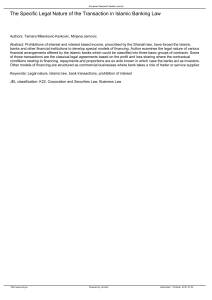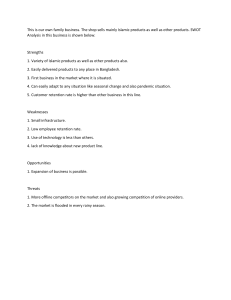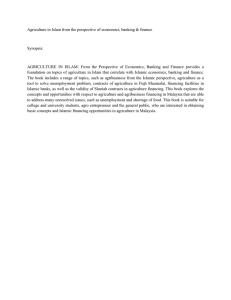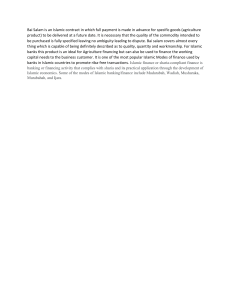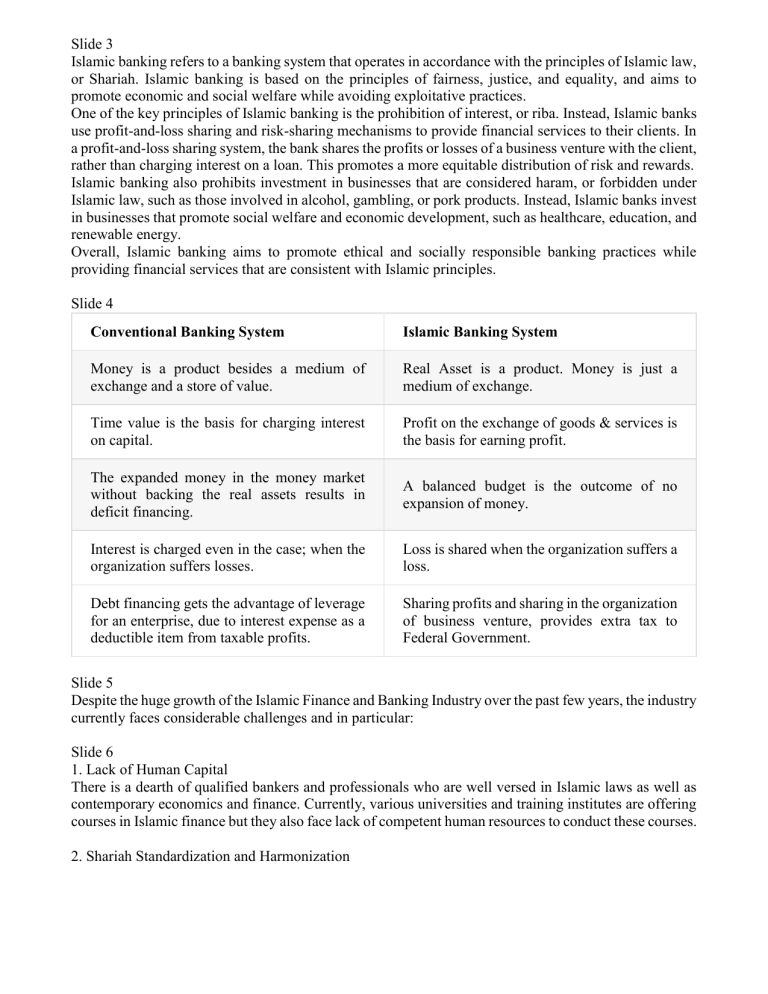
Slide 3 Islamic banking refers to a banking system that operates in accordance with the principles of Islamic law, or Shariah. Islamic banking is based on the principles of fairness, justice, and equality, and aims to promote economic and social welfare while avoiding exploitative practices. One of the key principles of Islamic banking is the prohibition of interest, or riba. Instead, Islamic banks use profit-and-loss sharing and risk-sharing mechanisms to provide financial services to their clients. In a profit-and-loss sharing system, the bank shares the profits or losses of a business venture with the client, rather than charging interest on a loan. This promotes a more equitable distribution of risk and rewards. Islamic banking also prohibits investment in businesses that are considered haram, or forbidden under Islamic law, such as those involved in alcohol, gambling, or pork products. Instead, Islamic banks invest in businesses that promote social welfare and economic development, such as healthcare, education, and renewable energy. Overall, Islamic banking aims to promote ethical and socially responsible banking practices while providing financial services that are consistent with Islamic principles. Slide 4 Conventional Banking System Islamic Banking System Money is a product besides a medium of exchange and a store of value. Real Asset is a product. Money is just a medium of exchange. Time value is the basis for charging interest on capital. Profit on the exchange of goods & services is the basis for earning profit. The expanded money in the money market without backing the real assets results in deficit financing. A balanced budget is the outcome of no expansion of money. Interest is charged even in the case; when the organization suffers losses. Loss is shared when the organization suffers a loss. Debt financing gets the advantage of leverage for an enterprise, due to interest expense as a deductible item from taxable profits. Sharing profits and sharing in the organization of business venture, provides extra tax to Federal Government. Slide 5 Despite the huge growth of the Islamic Finance and Banking Industry over the past few years, the industry currently faces considerable challenges and in particular: Slide 6 1. Lack of Human Capital There is a dearth of qualified bankers and professionals who are well versed in Islamic laws as well as contemporary economics and finance. Currently, various universities and training institutes are offering courses in Islamic finance but they also face lack of competent human resources to conduct these courses. 2. Shariah Standardization and Harmonization Islamic Law accommodates for differences of opinion and interpretations of classical Islamic texts. This leads to different practices and policies adopted across different jurisdictions. This may impact on the growth and internationalization of the Islamic Finance Industry. 3. Lack of Public Awareness There remains a low penetration rate and lack of critical mass in the Islamic Finance Industry. This is due to mainly a lack of public awareness and knowledge of Islamic Finance. Islamic Banks, regulators and Governments should undertake mass awareness programmes to drive the growth of Islamic Finance and create critical mass for the industry. Slide 7 4. Shariah Law and Legal Framework There remains a great need to harmonize Shariah Law with the existing legal framework. This creates huge difficulties and challenges in the event of disputes and legal matters as Islamic Financial concepts are not recognized by certain legal frameworks. 5. Regulation and Supervision Islamic Banks are exposed to various risks such as displaced commercial risk (DCR). This forces Islamic Banks to lose profits in order to pay comparable returns to investment account holders (IAH) and depositors. This create huge challenges for Islamic Banks in creating excess reserves to cover losses and how this is viewed from a regulatory perspective. 6. Access to Finance Muslim countries have shown a lower level of financial inclusion than other countries in the World. This can be resolved by creating a better business model, reforms to increase competition within the banking sector, consumer protection, better credit information and education. Slide 8 7. Monetary Policy and Liquidity Management There remains a huge shortage of Shariah central banking facilities. Moreover, many Islamic Banks operate under a dual system of conventional and Islamic Banking policy framework and are heavily influenced as a result by conventional banking instruments and conditions. 8. Tax Policy Regulatory/tax reforms play a pivotal role for the growth of any industry. There remain various tax issues which need to be resolved in order to level playing field between Islamic Banks and conventional banks. Some of these issues include the treatment of Islamic finance under income taxes, sales taxes, specific transaction taxes, and bilateral tax treaties. 9. Benchmark The usage of the conventional interest based benchmark (Libor) creates a negative perception among investors who tend to associate the Islamic Financial system with the conventional financial system due to the usage of the interest based benchmark. Furthermore, Islamic Banks are placed at the mercy of the movements in the conventional money markets by using the conventional interest based benchmark. Slide 9 Islamic and Ukrainian banking have several commonalities and differences, which we will explore below: Commonalities: Both Islamic and Ukrainian banking systems operate under the principles of banking regulation and supervision. Both banking systems are subject to various legal and regulatory frameworks designed to ensure stability and protect consumers' interests. Both banking systems provide a range of financial services, including loans, deposits, and investments. Slide 10 Differences: Islamic banking is based on the principles of Sharia law, which prohibits charging or paying interest (riba). In contrast, Ukrainian banking operates on an interest-based system. Islamic banking emphasizes profit and loss sharing (PLS), which means that the bank and the client share profits or losses resulting from investments. Ukrainian banking does not operate on the PLS principle. Islamic banking requires compliance with ethical and social principles in investment decisions, such as avoiding investments in gambling, alcohol, and other prohibited activities. In contrast, Ukrainian banking does not have such specific ethical guidelines. Islamic banking offers specific products, such as sukuk (Islamic bonds) and mudarabah (partnership financing), which are not available in Ukrainian banking. In summary, while Islamic and Ukrainian banking share commonalities such as regulation, consumer protection, and providing financial services, their fundamental differences lie in their principles and practices, particularly regarding interest, profit-sharing, ethical guidelines, and product offerings.

